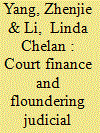| Srl | Item |
| 1 |
ID:
193190


|
|
|
|
|
| Summary/Abstract |
Decentralized court finance and personnel management practices have been criticized for breeding extra-judicial interventions and corruption in China. Determined to advance law-based governance and to constrain recalcitrant local leaders, the Chinese leadership under Xi Jinping in 2014 rolled out reforms to centralize local court finance to the provincial level with the aim to sever local courts from local influence. Despite high expectations, implementation is at best partial. Close to half of all provinces have not accomplished the required changes, and more than half of all court expenditure continues, to date, to remain reliant upon local governments. The direct reason is that provincial governments lack sufficient and sustainable fiscal capacity to finance the operation of local courts without central assistance. Different interests between major stakeholders, namely the courts and the fiscal bureaus, also add to coordination problems and difficulties in reform implementation, in particular the tension between fiscal adequacy pursued by the judiciary and fiscal management efficiency stressed by finance bureaus.
|
|
|
|
|
|
|
|
|
|
|
|
|
|
|
|
| 2 |
ID:
125632


|
|
|
|
|
| Publication |
2013.
|
| Summary/Abstract |
Carbon capture and storage (CCS) is being considered as an option to reduce CO2 emissions worldwide. Yet recent cases show that CCS faces divergent public acceptance issues. This paper investigates stakeholder perspectives on CCS in Indonesia. Q methodology was adopted to analyse the diversity of stakeholder perspectives. Four perspectives were identified: (1) "CO2 emissions reduction through clean energy sources rather than CCS"; (2) "CCS as one of the options in the transition to a sustainable energy system"; (3) "CCS as the only optimal solution to reduce CO2 emissions"; (4) "CCS is only a tactic to keep burning coal forever". Based on these results, we argue that stakeholder acceptance of CCS should be understood as a complex notion. This means that understanding whether or under what conditions stakeholders would be willing to support CCS, requires consideration of stakeholders' viewpoints about broader questions of CO2 emission reduction and energy supply in Indonesia, rather than studying attitudes towards CCS in isolation. We discuss how the approach taken in this study can be used and followed up in policymaking on CCS in Indonesia.
|
|
|
|
|
|
|
|
|
|
|
|
|
|
|
|